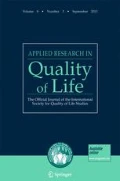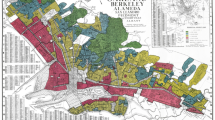Abstract
This study investigates the effect of social capital and negative events in 37 countries across six continents on subjective well-being, to improve the quality of life in creating sustainable cities and communities. Using large-scale, original, individual-level, cross-sectional survey data, we examine the relationships among negative events in social networks, social capital, and individuals’ subjective well-being. The negative impacts of these events on life satisfaction were found in both high-income and non-high-income countries. Moreover, people’s well-being was highly associated with well-organized social networks across all 37 countries, whereas the magnitude of the effects varied, this might be because the benefits realized from social network are variated across countries. Policies aimed at improving life satisfaction should not only focus on increasing the household income but also consider the substantial impact of social capital.

Similar content being viewed by others
Notes
The regression models for the face-to-face survey sample from Mongolia and Sri Lanka have poor fit; the results are displayed in the Appendix Table A1.
The classification standards of high-income countries (HIC) and non-high-income countries (non-HIC) are based on the criterions of world bank. Based on the gross national income (GNI) per capita in 2017, the world bank list of economies (2018) classified world economies into high-income—if the income is $12,056 or higher—and non-high income—if the income is less than $12,056—economies.
It is known that when the regression model has multicollinearity problem, the parameters of explanatory variables might be estimated to have a strong bias. One way to address the multicollinearity problem is to add the regressors one by one to confirm whether the regression models exhibit multicollinearity. Therefore, the robustness check is proceeded by adding social capital and negative events one by one, and consistent results are derived, which indicates the regression model does not have multicollinearity. Because of the limited space, in the manuscript, we provide the following results by request.
References
Appleton, A., & Song, L. (2008). Life satisfaction in urban China: Components and determinant. World Development, 36(11), 2325–2340.
Ateca-Amestoy, V., Aguilar, A. C., & Moro-Egido, A. I. (2014). Social interactions and life satisfaction: Evidence from Latin America. Journal of Happiness Studies, 15(3), 527–554.
Becchetti, L., Pelloni, A., & Rossetti, F. (2008). Relational goods, sociability, and happiness. Kyklos, 61(3), 343–363.
Bjørnskov, C. (2003). The happy few: Cross–country evidence on social capital and life satisfaction. Kyklos, 56(1), 3–16.
Bjørnskov, C. (2008). Social capital and happiness in the United States. Applied Research in Quality of Life, 3(1), 43–62.
Borghesi, S., & Vercelli, A. (2012). Happiness and health: Two paradoxes. Journal of Economic Surveys, 26(2), 203–233.
Bourdieu, P. (1983). The forms of capital. Translated by Richard Nice. Handbook of Theory and Research for the Sociology of Education, 183–198.
Brown, S., Gray, D., & Roberts, J. (2015). The relative income hypothesis: A comparison of methods. Economics Letters, 130, 47–50.
Bruni, L., & Stanca, L. (2008). Watching alone: Relational goods, television, and happiness. Journal of Economic Behavior & Organization, 65(3), 506–528.
Casini, M., Bastianoni, S., Gagliardi, F., Gigliotti, M., Riccaboni, A., & Betti, G. (2019). Sustainable development goals indicators: A methodological proposal for a multidimensional fuzzy index in the Mediterranean area. Sustainability, 11(4), 1198.
Corbacho, A., Philipp, J., & Ruiz-Vega, M. (2015). Crime and erosion of trust: Evidence for Latin America. World Development, 70, 400–415.
Chapman, A., Fujii, H., & Managi, S. (2019). Multinational life satisfaction, perceived inequality, and energy affordability. Nature Sustainability, 2(6), 508–514.
Chen, D., & Yang, T. C. (2014). The pathways from perceived discrimination to self-rated health: An investigation of the roles of distrust, social capital, and health behaviors. Social Science & Medicine, 104, 64–73.
Clark, W. A., Yi, D., & Huang, Y. (2019). Subjective well-being in China’s changing society. Proceedings of the National Academy of Sciences, 116(34), 16799–16804.
Costa, D. L., & Kahn, M. E. (2003). Civic engagement and community heterogeneity: An economist's perspective. Perspectives on Politics, 1(1), 103–111.
Cuñado, J., & de Gracia, F. P. (2012). Does education affect happiness? Evidence for Spain. Social Indicators Research, 108(1), 185–196.
Coleman, J. S. (1988). Social capital in the creation of human capital. American Journal of Sociology, 94, S95–S120.
Costanza, R., d'Arge, R., De Groot, R., Farber, S., Grasso, M., Hannon, B., et al. (1997). The value of the world's ecosystem services and natural capital. nature, 387(6630), 253–260.
Dale, A., & Newman, L. (2010). Social capital: A necessary and sufficient condition for sustainable community development? Community development journal, 45(1), 5–21.
Diener, E., Oishi, S., & Tay, L. (2018). Advances in subjective well-being research. Nature Human Behaviour, 2(4), 253–260.
Diener, E., & Tay, L. (2017). A scientific review of the remarkable benefits of happiness for successful and healthy living. Happiness, 90.
Durand, M., & Smith, C. (2013). The OECD approach to measuring subjective well-being. In J. Helliwell, R. Layard, & J. Sachs (Eds.), World Happiness Report (pp. 112–137).
Duesenberry, J. S. (1949). Income, savings, and the theory of consumer behaviour. Harvard UP.
Easterlin, R. A. (2001). Income and happiness: Toward a unified theory. The Economic Journal, 111, 465–484.
Elgar, F. J., Davis, C. G., Wohl, M. J., Trites, S. J., Zelenski, J. M., & Martin, M. S. (2011). Social capital, health, and life satisfaction in 50 countries. Health & Place, 17(5), 1044–1053.
Engbers, T. A., Thompson, M. F., & Slaper, T. F. (2017). Theory and measurement in social capital research. Social Indicators Research, 132(2), 537–558.
Ferrer-i-Carbonell, A. (2005). Income and well-being: An empirical analysis of the comparison income effect. Journal of Public Economics, 89, 997–1019.
Frey, B. S., & Stutzer, A. (2002). What can economists learn from happiness research? Journal of Economic Literature, 40(2), 402–435.
Gleibs, I. H., Morton, T. A., Rabinovich, A., Haslam, S. A., & Helliwell, J. F. (2013). Unpacking the hedonic paradox: A dynamic analysis of the relationships between financial capital, social capital, and life satisfaction. British Journal of Social Psychology, 52(1), 25–43.
Greene, W. H. (2012). Econometric analysis 7th ed (international).
Gui, B., & Sugden, R. (2005). Economics and social interaction: Accounting for interpersonal relations. Cambridge University Press.
Hamermesh, D. (1977). Economic aspects of job satisfaction. In W. Oates (Ed.), Ashenfelter, O. Essays of labor market analysis.
Helliwell, J. F. (2003). How's life? Combining individual and national variables to explain subjective well-being. Economic Modelling, 20(2), 331–360.
Helliwell, J. F., & Putnam, R. D. (2004). The social context of well–being. Philosophical Transactions of the Royal Society of London. Series B: Biological Sciences, 359(1449), 1435–1446.
Kahneman, D., & Deaton, A. (2010). High income improves evaluation of life but not emotional well-being. Proceedings of the National Academy of Sciences of the United States of America, 107(38), 16489–16493.
Leibenstein, H. (1950). Bandwagon, snob, and vebren effects in the theory of consumer’s demand. Quarterly Journal of Economics, 64(2), 183–207.
Lyubomirsky, S., King, L., & Diener, E. (2005). The benefits of frequent positive affect: Does happiness lead to success? Psychological Bulletin, 131(6), 803–855.
Ma, X. (2016). Income inequality and subjective happiness in urban region. In Kado, H. &. Kajitani, K. (eds.) Chinese Type Capitalism Going Beyond the Double Trap, Tokyo: Mineluvi Press. (in Japanese).
Ma, X., & Piao, X. (2019). The impact of intra-household bargaining power on happiness of married women: Evidence from Japan. Journal of Happiness Studies, 20(6), 1775–1806.
Maass, R., Kloeckner, C. A., Lindstrøm, B., & Lillefjell, M. (2016). The impact of neighborhood social capital on life satisfaction and self-rated health: A possible pathway for health promotion? Health & Place, 42, 120–128.
Newman, B. Y. (2011). Happiness improves health. Optometry-Journal of the American Optometric Association, 82(7), 403–404.
Neira, I., Bruna, F., Portela, M., & García-Aracil, A. (2018). Individual well-being, geographical heterogeneity, and social capital. Journal of Happiness Studies, 19(4), 1067–1090.
Oswald, A. J., Proto, E., & Sgroi, D. (2015). Happiness and productivity. Journal of Labor Economics, 33(4), 789–822.
Pih, K. K. H., De La Rosa, M., Rugh, D., & Mao, K. (2008). Different strokes for different gangs? An analysis of capital among Latino and Asian gang members. Sociological Perspectives, 51(3), 473–494.
Putnam, R. D. (2000). Bowling alone: The collapse and revival of American community. Simon and Schuster.
Polasky, S., Kling, C. L., Levin, S. A., Carpenter, S. R., Daily, G. C., Ehrlich, P. R., Heal, G. M., & Lubchenco, J. (2019). Role of economics in analyzing the environment and sustainable development. Proceedings of the National Academy of Sciences, 116(12), 5233–5238.
Ram, R. (2010). Social capital and happiness: Additional cross-country evidence. Journal of Happiness Studies, 11(4), 409–418.
Rothstein, B. (2001). Social capital in the social democratic welfare state. Politics and Society, 29(2), 207–241.
Smyth, R., Nielsen, I., & Zhai, Q. (2010). Personal well-being in urban China. Social Indicators Research, 95, 231–251.
Stevenson, B., & Wolfers, J. (2013). Subjective well-being and income: Is there any evidence of satiation? American Economic Review, 103(3), 598–604.
Di Tella, R., MacCulloch, R. J., & Oswald, A. J. (2003). The macroeconomics of happiness. Review of Economics and Statistics, 85(4), 809–827.
Tsurumi, T., Imauji, A., & Managi, S. (2019). Relative income, community attachment and subjective well–being: Evidence from Japan. Kyklos, 72(1), 152–182.
Tsurumi, T., & Managi, S. (2017). Monetary valuations of life conditions in a consistent framework: The life satisfaction approach. Journal of Happiness Studies, 18(5), 1275–1303.
United Nations. (2015). Resolution a/RES/70/1. Transforming our world: The 2030 agenda for sustainable development. Seventieth General Assembly, New York, 15 September–2 October. Resolutions.
Vemuri, A. W., Morgan Grove, J., Wilson, M. A., & Burch Jr., W. R. (2011). A tale of two scales: Evaluating the relationship among life satisfaction, social capital, income, and the natural environment at individual and neighborhood levels in metropolitan Baltimore. Environment and Behavior, 43(1), 3–25.
Vendrik, M. C. M., & Woltjer, G. B. (2007). Happiness and loss aversion: Is utility concave or convex in relative income? Journal of Public Economics, 91, 1423–1448.
Wooldridge, J. (2010). Econometric analysis of cross section and panel data (2nd ed.). The MIT Press.
Yuan, H. (2016). Structural social capital, household income and life satisfaction: The evidence from Beijing, Shanghai and Guangdong-Province, China. Journal of Happiness Studies, 17(2), 569–586.
Zhang, R. J. (2020). Social trust and satisfaction with life: A cross-lagged panel analysis based on representative samples from 18 societies. Social Science & Medicine, 112901.
Acknowledgements
This research was supported by the Environment Research and Technology Development Fund (JPMEERF20201001) of the Environmental Restoration and Conservation Agency of Japan.
Author information
Authors and Affiliations
Corresponding author
Additional information
Publisher’s Note
Springer Nature remains neutral with regard to jurisdictional claims in published maps and institutional affiliations.
Supplementary Information
ESM 1
(DOCX 45 kb)
Rights and permissions
About this article
Cite this article
Piao, X., Ma, X., Tsurumi, T. et al. Social Capital, Negative Event, Life Satisfaction and Sustainable Community: Evidence from 37 Countries. Applied Research Quality Life 17, 1311–1330 (2022). https://doi.org/10.1007/s11482-021-09955-1
Received:
Accepted:
Published:
Issue Date:
DOI: https://doi.org/10.1007/s11482-021-09955-1




